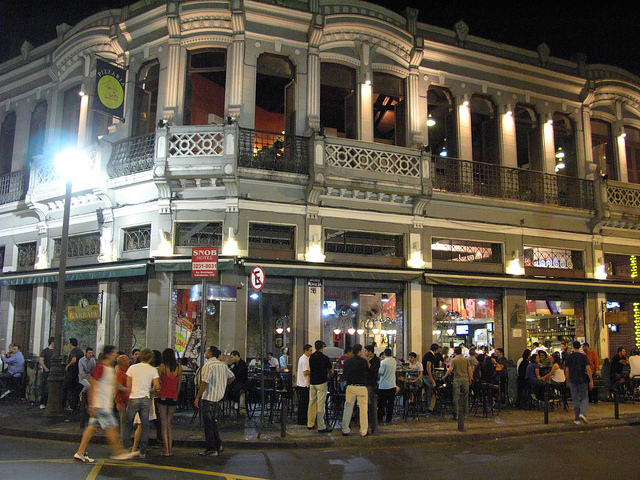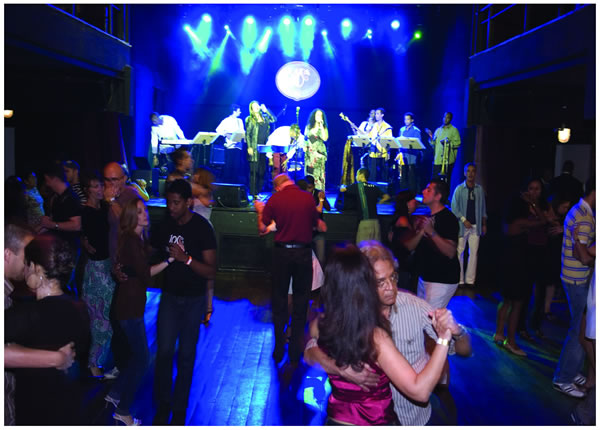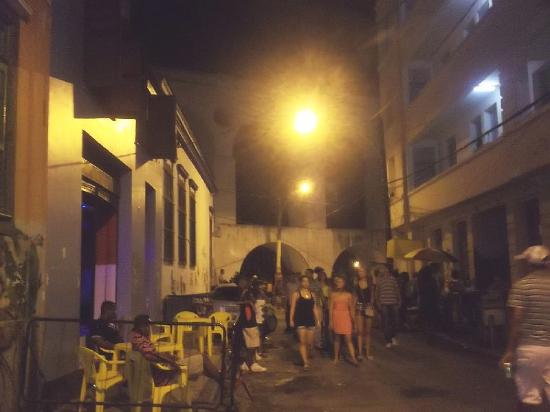He had just finished eating at Boteco do Beco, near the Naval Museum, which was his favorite place to eat in Centro. It was an old-school Rio place, serving traditional food at good prices (he loved the dobradinha), and he hardly ever saw a woman eat there. He then got on the metro and headed back to Zona Sul and his little hotel on Rua Republica do Peru to kill some time before heading out to Lapa for the night. His wingman Paulo couldn’t join him tonight, having to deal with some issues with his girlfriend Silvia. Gone were the days when he and Paulo would head out to Via Show or other funk clubs to get hammered and grind their crotches into the ample bottoms of the local favela rats, but at least he had the memories. And he was still very close to Paulo’s father and the rest of his family.
Paulo was crazy, which was one of the reasons he liked him, but he sensed the creeping tendrils of female domestication threatening to cramp his once unrestrained style. Maybe that was inevitable. But he was a great wingman, able to time his interjections into a conversation in a way that was unobtrusive but generated sufficient momentum to keep the group energized. It was an art form, like that of the omuko, the professional shouters in Japanese kabuki theatre, who knew how to time their special yago shouts (Yamatoya! Godaime! Mattemashita!) in a way that was coordinated perfectly to keep the stage actors flowing and moving.
Everyone needs a little external motivation now and then.
Silvia could be slightly overbearing in the exuberant way that big brasileiras can be, but he still liked her and thought she was a cool chick. She never cared that he and Paulo went out together on the prowl. “You two safados go do what you want. I’ll see you when you get back”, she would say. She once broke up a fight at a barzinho by pulling the guys apart with her own hands and yelling at them. Now that was cool. And he had a weird connection to her somehow, having banged her boss, a wild-eyed cabeleleira and business owner named Renata who lived near Rua Visconte de Piraja in Ipanema. All it took was an introduction, and he had taken it from there. Renata had an impressive body and a nice thick bundao, but she was also a ball-busting pain in the ass. So it was a short relationship.
Lapa was better on Fridays, but Saturdays were still good. He walked through the crowded streets near Siqueira Campos and entered the metro there. Getting off at Cinelandia station, he walked to Lapa, passing under the aqueduct-looking Arcos da Lapa where paupers and druggies congregated. He made a couple passes around Lapa, checking out Bar da Boa and Carioca da Gema, and when nothing seemed to be promising, he headed for Lapa 40 Graus. He hadn’t been there in years and figured it was worth a shot.
Why does it feel like I’ve been doing this for decades, he asked himself. And he told himself, because, you asshole, you have been doing this for decades. Some men are just fated to walk the earth, maybe.
As he walked along the dirty streets he passed a glass door with a lace-like pattern of cracks in the glass, and suddenly a dormant memory flashes in his mind’s eye from when he was very young.
It is winter 1992 and you are in Pohang, South Korea. “Sir”, says Sgt. Wycklow, “the MPs have detained Cpl. Robinson. I think we’ve got to go get him.” So you secure your rifle and personal gear and head out from MCP to a seedy, nasty strip of bars and shops that exist in the dregs of Pohang to service deployed Marines. When you get there Robinson is already pressed up against the wall by two huge MPs with black nightsticks and you go over to talk to them. You are a good talker, the best, and you know it, and you can get him out of this situation. A greasy little Korean rat bar proprietor with a mole between his eyebrows is swaying back and forth with his index finger jabbing insistently near your solar plexus. He is accusing Robinson of punching and breaking the window of his bar but you look into his eyes and know the dink is lying. Fucking lying. The eyes, Chico. They never lie. But you know it’s useless to argue so you pay off the Korean rat with a fistful of won. Probably about forty thousand, maybe a bit more. Then you take Robinson away and give him a lecture, not too harsh, because he’s a good worker and you know the dink was fucking lying.
He arrives Lapa 40 Graus and gets in line. Security frisks him then he shows his ID (an expired international drivers’ license) and gets his magnetic club card used to buy drinks and food inside. Last time he was there it was a paper card. It’s an extra 20 reais for access to the dance floor, and he pays it. He goes up the stairs, past the sinuca tables, and enters the dance hall, where a decent live band is already playing Brazilian music; couples glide across the floor here and there, some men sporting small straw hats that are popular but which he does not know the specific name of, except the generic word chapeus. He is suddenly conscious of his own inadequacies. Damn, he thinks, I really need to learn these dances.
Ordering a beer he sits near a group of girls and makes conversation, insinuating himself into their circle. His dancing game is awful, and he knows it, because he has made little to no effort to learn Brazilian dances. His language game is very good, though, and this counts for a lot. But maybe this was not the right place to come to. Maybe he should have headed to Leme or Leblon, the scene of past glories, where he had closed with some chick at Club Melt during one of his first Rio trips. That was back in 2004. The dance floor at that time at Club Melt shook and trembled disconcertingly but it was still a great place.
He remembered the video screen there at Melt that night had kept playing and replaying a video clip of the 2004 Pacers-Pistons brawl, with Ron Artest leaping into the stands. That somehow gave the place an electrically charged sexual intensity that he used to good advantage with a short garota with a kicking body and nipples that projected proudly through her camisa. He worked her good, real good, with the image of Ron Artest on a huge video screen in the background leaping into the stands to brawl with fans, looped over and over again.
He gets in a few approaches at Lapa 40 Graus, gets a cell number and a business card from a couple of girls, but nothing he knows will lead to anything. He goes down the the sinuca tables and opens up a girl in a blue striped dress and a jutting ass, looking out the window onto the street below. She is not interested and makes that clear. One negrita with a beautiful smile takes pity on him and shows him a few of the local dance moves, which was cool.
No other guys are making approaches that he could see; small social circles are staying tightly with their own groups. Brazil is a society of tribes and subtribes, he thinks. Pipelining is the way to go here. Better get your own tribe and work things that way. This is the best way of pre-selection. Paulo’s female friends were and had always been his best option, and he knew it.
The night surges on. Little tribes of girls are taking more and more pictures of each other with smart phones and seeking the shelter of their chattering peers. It seems to get worse every year like that, he thinks. And more and more of the girls every year are sporting tattoos, he notices. The band is good, very good, as live acts in Rio always are, and this counts for a lot. The crowd works itself into a seething mass, couples caroming off each other like agitated atoms. Strangely, although it has been a night of failure, he feels good. At about 3:30 a.m. he decides to call it quits and edges his way past the drunken dancers on the first floor, pays his bill, and leaves the club.
On the sidewalk outside, he leans against a pole and watches a stray dog with a loping gait nibble cautiously on a morsel of food in the gutter. It is time to go. His mind turns to Renata, her nice body, white teeth, and carefully depilated legs and bronzed skin; and her apartment in Ipanema, with the surly doorman and the rickety wire mesh elevator he loved, and he wishes things could have been different with her, that he could end the night in her arms, and wake up and bang her raw-dog in the shower like she loved. But he knows that those days are long gone and there is no point in dwelling on that.
He hails a taxi and heads back to his hotel, chatting with the driver about inflation, girls, Fluminense and Flamengo football, and corrupt politicians.
The cab glides near the shoreline near Botofogo and Flamengo, and on the water, reflections of bobbing watercraft shimmer and pulse in the flickering pallor of the morning’s ocean phosphorescence. A steady train of linked impressions of the night, and of years past, move through his mind as gleams of lemon-yellow surrounding the masses on the horizon portend sunrise. He turns away from the water and, in the hills in the distance and over the tops of boxy apartment buildings lining the waterfront, the iridescent orange lights of the favelas mingle hauntingly with waning clusters of stars in the dissolving darkness, swirling and cascading like sparks arcing off flint-struck steel, melting gently into the dawn.
Read More: Nothing Is Permanent




